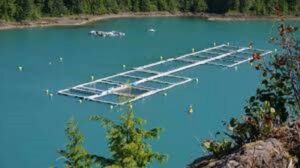Aquaculture Act proposed for Canada
 By Lynn Moreau
By Lynn Moreau
Aquaculture is the farming of aquatic organisms in fresh or saltwater and can take place either in lakes (open-net pens) or in land-based facilities. Aquaculture is a large-scale commercial industry that is quickly becoming a key agri-food sector. This sector includes the involvement of a number of Anishinabek Nation First Nations. It provides economic benefits and food security to the local and regional economy and has the potential to double production by 2028.
The Department of Fisheries and Oceans is responsible for environmental regulation of the sector in cooperation with the Province of Ontario, which licenses production and regulates environmental impacts. The 2019 mandate letter from the Prime Minister to the Minister of Fisheries, Oceans, and the Canadian Coast Guard asked the Minister to “begin work to introduce Canada’s first-ever Aquaculture Act”.
The Federal Fisheries Act allows the Minister to issue aquaculture leases and licenses as well as administer fees and issue management orders to ensure the conservation and protection of fish. The new Aquaculture Act will replicate newly developed sections of the Fisheries Act.
Since aquaculture occurs in or near the traditional territories of many Indigenous nations in Canada, and multiple Indigenous peoples participate directly and indirectly in aquaculture, the Aquaculture Act would establish a clear method to enable participation while respecting Indigenous rights. It is proposed that the Aquaculture Act would clearly outline and enable forms of regulatory cooperation between governments, including Indigenous governing bodies, by mirroring the current Fisheries Act construct for agreements and delegation.
The Minister would be able to establish areas that represent a unified ecological or social unit, as identified through a collaborative process and allow Indigenous groups and local stakeholders to provide advice on decisions made in a given area. The intention would be to allow the Minister the opportunity to discuss the spatial allocation of aquaculture sites with provinces, Indigenous groups and local communities, and to harmonize aquaculture activities with other users of the aquatic resource in a defined area. The Act would also address environmental protection, enforcement and compliance and public reporting through the development of regulations.
A Discussion Paper has been developed to outline the changes that will take place with the development of the Aquaculture Act, and submissions on the Act have been requested.
The consultation period concluded on January 15, 2021.
If you require additional information on the new proposed Aquaculture Act, please contact me:
Lynn Moreau
Lands and Resources Coordinator, Agriculture and Food
Lynn.moreau@anishinabek.ca


